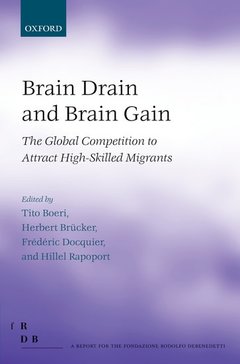Brain Drain and Brain Gain The Global Competition to Attract High-Skilled Migrants Fondazione Rodolfo Debendetti Reports Series
Langue : Anglais
Coordonnateurs : Boeri Tito, Brücker Herbert, Docquier Frédéric, Rapoport Hillel

The worldwide race to attract talents is getting tougher. The US has been leading the race, with its ability to attract PhD candidates and graduates not only from emerging countries, but also from the European Union. However, a growing number of countries have adopted immigration policies specifically aimed at selecting and attracting skilled workers. This book describes the global competition to attract talents. It focuses in particular on two phenomena: the brain gain and brain drain associated with high-skilled migration. Part I provides an overview of immigration policies designed to draw in skilled workers. It describes the economic gains associated with skilled immigration in the destination countries and the main determinants of the inflows of skilled immigrants (such as wage premia on education and R&D spending). It also discusses why skill-selective immigration policies do not find more support in receiving countries and shows that interest groups are actively engaged in affecting policies towards skilled migrants. Part II examines the consequences of brain drain for the sending countries. It reviews the channels through which skilled emigration can affect the source countries and looks at remittances, return migration, diaspora externalities, and network effects that may compensate the sending countries for their loss of human capital. Contrary to traditional wisdom, the results indicate that most developing countries experience a net gain from skilled emigration.
Introduction. Part I: Understanding Highly Skilled Migration in Developed Countries: The Upcoming Battle for Brains. Introduction. 1. Selecting the Highly Skilled: An Overview on Current Policy Approaches. 2. Global Trends in High Skilled Immigration. 3. The Determinants of Highly Skilled Migration: Evidence from OECD Countries, 1980 - 2005. 4. The effects of Brain Gain on Growth, Investment, and Employment: Evidence from OECD Countries, 1980 - 2005. 5. The Political Economy of Skilled Immigration. 6. Can the Battle for Brains turn into a Tragedy of the Commons?. 7. Conclusions. Comments by Sascha Becker and Franco Peracchi. Part II: Quantifying the Impact of Highly-Skilled Emigration on Developing Countries. Introduction. 8. The Size of the Brain Drain. 9. Theory, Evidence, and Implications. 10. Policy Issues. 11. Conclusions. Comments by Antonio Spilimbergo and Alessandra Venturini.
After obtaining his Ph.D. in Economics from New York University, Tito Boeri was senior economist at the Organisation for Economic Co-operation and Development (OECD) from 1987 to 1996. In this position, among other things, he coordinated all the work carried out by the OECD in the field of human resource policies in the central and eastern European economies in transition after 1990. He was also consultant to the International Monetary Fund and the World Bank. Professor Boeri teaches courses on labour economics and the economics of transition and he is affiliated with the Innocenzo Gasparini Institute for Economic Research (IGIER). He is research fellow of CEPR (Centre for Economic Policy Research) and of the Davidson Institute at the University of Michigan. Herbert Brücker studied economics, sociology, and politics at the University of Frankfurt am Main, where he received his doctoral degree in economics in 1994. He received his Habilitation degree in economics from the University of Technology (TU) in Berlin in 2005. He holds the positions of Visiting Professor at the Aarhus School of Business, of senior researcher at the German Institute for Economic Research (DIW Berlin) and the German Development Institute (GDI), and of research associate at the University of Frankfurt. Frédéric Docquier is a Consultant for the World Bank and Economic Advisor at the Regional Government of Wallonia. He holds a Ph.D. in Economics from the University of Aix-Marseille 2. His research interests are in computable general equilibrium models, intergenerational transfers and aging, international migration, and economic development. Hillel Rapoport holds a Ph.D. in Economics from the University of Paris II. He has been Visiting Assistant Professor at the Stanford University. He also serves or has served as consultant on migration issues for the World Bank, the Inter-American Development Bank, the G-20, and the United Nations University World Institute for Development Economics Research.
Date de parution : 07-2012
Ouvrage de 336 p.
16.3x24.1 cm
Thème de Brain Drain and Brain Gain :
© 2024 LAVOISIER S.A.S.



